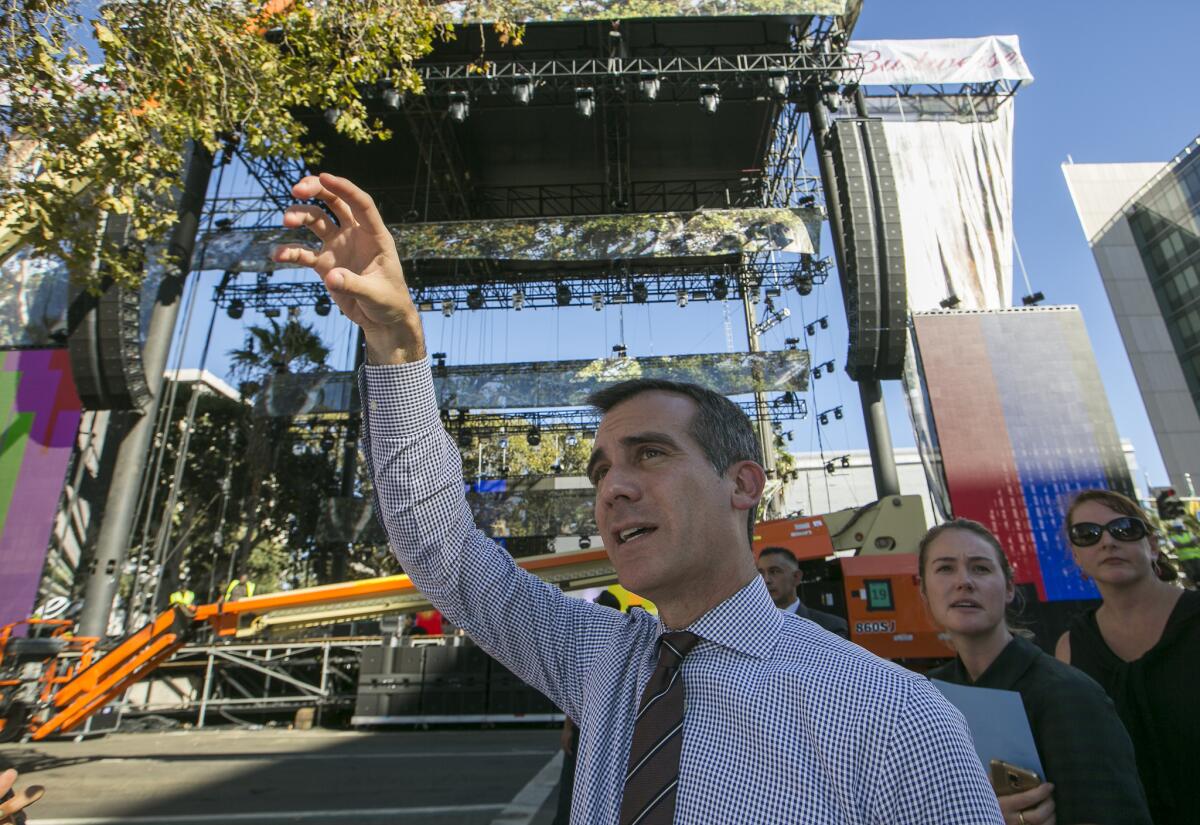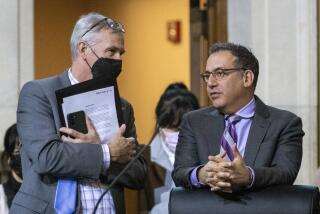Most L.A. City Council offices got free tickets to Made in America

Dozens of tickets to the Made in America festival were distributed to Los Angeles City Council offices last week by representatives of Mayor Eric Garcetti, provided free by concert promoter Live Nation.
Tickets were given to 12 of the 15 council offices, according to a statement released Wednesday by a spokesman for the mayor in response to questions from The Times. Most offices received four tickets covering both days of the weekend festival; Council President Herb Wesson’s office received 10 two-day tickets.
Earlier in the day, representatives of council members Joe Buscaino, Bernard C. Parks, Mitch Englander, Bob Blumenfield, Nury Martinez and Mike Bonin confirmed that their offices were offered free tickets.
Tickets for a single day of the rap and rock music festival were priced at just under $100, while weekend passes sold for $185. Those amounts were later discounted as the event approached.
Under current city rules, the maximum gift that city lawmakers can accept from bidders, contractors and others with a financial stake in a city decision is $100. However, mayoral spokesman Yusef Robb said that because the festival was sponsored by the city, mayoral officials were legally allowed to receive and hand out the tickets.
“The acceptance and distribution of these tickets is entirely appropriate,” Robb said, citing advice from lawyers for the mayor and City Atty. Mike Feuer. “This is in accordance with state and city regulations.”
Robb said aides to the mayor would soon file state paperwork providing more detail about the recipients and what they received. In addition to the council offices, some other city staff received tickets, he said.
“A complete list will be filed on the form,” Robb said in a statement. In addition to the tickets provided to city employees, Robb said that roughly 500 tickets were distributed to local organizations for community members.
Some council members -- Paul Krekorian, Tom LaBonge and Mitch O’Farrell -- did not accept the tickets, according to their representatives. Free tickets were also offered to the staff of City Controller Ron Galperin, who turned them down, according to a spokesman.
“We felt it was inappropriate,” said Galperin spokesman Lowell Goodman. “We adhere to the highest ethical standards possible, and sometimes that means going above and beyond the rules.”
Goodman added that their refusal did not mean that the controller had determined that accepting tickets would violate any city rules, but the controller wanted to avoid “even the appearance of anything that could be considered improper.”
Aides in other council offices could not immediately provide information about whether they were given tickets; some did not return calls or referred questions to the mayor’s office. Ethics Commission staffers were not immediately available for comment on the city rules.
The popular music event, widely considered an entertainment success that also boosted some downtown businesses, was not without controversy: Garcetti touted his aggressive pursuit of the festival as a way of cutting red tape, but the fact that city officials smoothed the way for concert promoter Live Nation and organizer Jay Z troubled Councilman Jose Huizar and others who felt excluded from the planning process. Downtown residents also raised concerns about noise and security ahead of the festival.
Robb argued that those spurts of controversy were “a tempest in a teapot.” Providing tickets to the council offices was important because “we wanted to make sure that people saw firsthand the undeniable success of this event,” he said.
Bob Stern, former president of the now-closed Center for Governmental Studies in Los Angeles, said such arrangements are common when cities sponsor events -- and are often spelled out in the event contracts.
“Usually the rationale is, the city really needs to monitor what’s happening, so the city shouldn’t be paying to monitor an event on their own property,” Stern said. “The other reason is that city officials like to attend these events and don’t like to pay for it.”
Follow @latimesemily for what’s happening at Los Angeles City Hall
More to Read
Sign up for Essential California
The most important California stories and recommendations in your inbox every morning.
You may occasionally receive promotional content from the Los Angeles Times.











